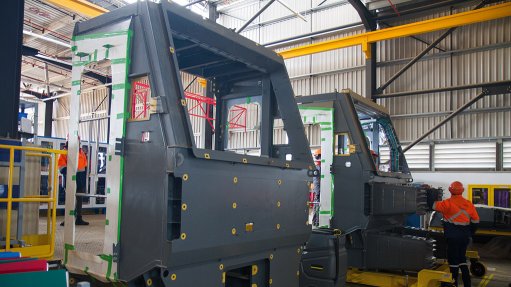
Work on the first car-body shell has started
Photo by: Duane Daws
Gibela has initiated manufacturing trials of the first locally made train car at the Gibela train factory, in Dunnottar, on the East Rand.
The first train’s car-body shell – essentially, its panel-clad metal frame – is expected to be completed by the end of the first quarter of 2018, with the first completed six-car train to be delivered by the end of the year.
Gibela’s head office early in January also relocated from Woodmead to the plant, moving management closer to the manufacturing site.
Construction of the Dunnottar plant should be completed by March 31, with the factory’s industrial content being readied and commissioned as construction work on the various buildings wraps up.
The factory site will include a car-body-shell building, a fitting building, a warehouse building, a testing and commissioning building, a central administration complex, a training centre and a 1.25 km dynamic test track.
The Gibela consortium has to deliver 600 new X’Ttrapolis Mega commuter trains (3 600 cars) to the Passenger Rail Agency of South Africa (PRASA) in a R59-billion deal signed in 2014. Local parts content on the 580 trains to be build in South Africa is promised to be between 65% to 70%, by volume.
Alstom Southern Africa is the majority shareholder in Gibela (61%), while black empowerment partners New Africa Rail and Ubumbano Rail hold 9% and 30% respectively.
Construction of the Dunnottar plant is currently more than 80% complete, says Gibela industrial director Bruce Devega.
Completion of the rail infrastructure, such as sidings, staging rails, and the test track, is targeted for completion by mid-February.
All cranes were in put in place in December.
All mechanical installations should be completed by the end of March.
Current “pressure points” include securing municipal power supply – 40 MVA – to the plant, which is only scheduled for April. Current supply – 5 MVA – is a temporary feed made available by the Ekurhuleni municipality, with the remainder supplied by generator, notes Devega.
Another pressure point is completion of the train testing and commissioning building.
“It is a complex process to put everything in place,” says Gibela construction team industrial design lead Matthew Cross.
“It’s a job stopper if this building is not complete. It must be ready to receive trains by the end of March.”
The number of construction workers at the building site is currently around 1 000, with 78% of this number employed from the communities surrounding the Dunnottar plant.
Local small, medium-sized and microenterprises earned around R128-million from construction work on the plant last year.
Industrial Content
Inside the carbody shell building 90% of the 65 spotwelding guns have been commissioned and validated.
The eight automated welding robots have also been installed.
Commissioning of the first cathedral – a structure where the trains’ sub-assemblies are ‘married’ – is scheduled for the middle of the year.
Plant employees currently number more than 460, with 363 involved in rolling stock manufacturing, and 99 with maintenance and service activities.
The number of employees inside the plant is expected to increase to 625 by the end of March.
Gibela will have to build two train cars a day at the peak of production in 2019.